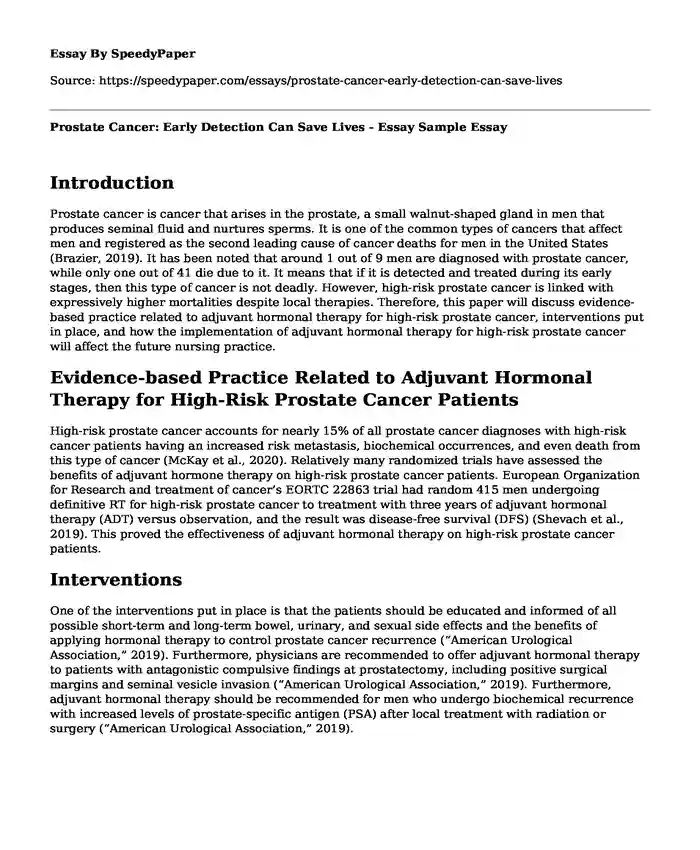
| Type of paper: | Essay |
| Categories: | Medicine Cancer Healthcare |
| Pages: | 3 |
| Wordcount: | 637 words |
Introduction
Prostate cancer is cancer that arises in the prostate, a small walnut-shaped gland in men that produces seminal fluid and nurtures sperms. It is one of the common types of cancers that affect men and registered as the second leading cause of cancer deaths for men in the United States (Brazier, 2019). It has been noted that around 1 out of 9 men are diagnosed with prostate cancer, while only one out of 41 die due to it. It means that if it is detected and treated during its early stages, then this type of cancer is not deadly. However, high-risk prostate cancer is linked with expressively higher mortalities despite local therapies. Therefore, this paper will discuss evidence-based practice related to adjuvant hormonal therapy for high-risk prostate cancer, interventions put in place, and how the implementation of adjuvant hormonal therapy for high-risk prostate cancer will affect the future nursing practice.
Evidence-based Practice Related to Adjuvant Hormonal Therapy for High-Risk Prostate Cancer Patients
High-risk prostate cancer accounts for nearly 15% of all prostate cancer diagnoses with high-risk cancer patients having an increased risk metastasis, biochemical occurrences, and even death from this type of cancer (McKay et al., 2020). Relatively many randomized trials have assessed the benefits of adjuvant hormone therapy on high-risk prostate cancer patients. European Organization for Research and treatment of cancer’s EORTC 22863 trial had random 415 men undergoing definitive RT for high-risk prostate cancer to treatment with three years of adjuvant hormonal therapy (ADT) versus observation, and the result was disease-free survival (DFS) (Shevach et al., 2019). This proved the effectiveness of adjuvant hormonal therapy on high-risk prostate cancer patients.
Interventions
One of the interventions put in place is that the patients should be educated and informed of all possible short-term and long-term bowel, urinary, and sexual side effects and the benefits of applying hormonal therapy to control prostate cancer recurrence (“American Urological Association,” 2019). Furthermore, physicians are recommended to offer adjuvant hormonal therapy to patients with antagonistic compulsive findings at prostatectomy, including positive surgical margins and seminal vesicle invasion (“American Urological Association,” 2019). Furthermore, adjuvant hormonal therapy should be recommended for men who undergo biochemical recurrence with increased levels of prostate-specific antigen (PSA) after local treatment with radiation or surgery (“American Urological Association,” 2019).
Effects of Adjuvant Hormonal Therapy for High-Risk Prostate Cancer Implementation on Nursing Practice
Implementation of adjuvant hormonal therapy will positively and noticeably affect my future nursing since I will be well informed when under what conditions a prostate cancer patient should be referred for adjuvant hormonal therapy. Further, it will help me know and quickly identify the needs of high-risk prostate cancer patients and address them effectively.
Conclusion
Following the possibilities of disease recurrence and deaths of high-risk prostate cancer patients, adjuvant hormonal therapy is the most effective core measure that should be applied mainly in cases where traditional therapies have already been used to prostate cancer patients. Combined with a healthy diet, exercise, and maintenance of a healthy weight, adjuvant hormonal therapy is beneficial for high-risk prostate cancer patients. It is worth noting adjuvant hormonal therapy's side effects to high-risk prostate cancer patients, such as loss of bone, diabetes, and heart disease. Thus the patient and doctor should talk about them before beginning prostate cancer treatment.
References
American Urological Association. (2019). Adjuvant and Salvage Radiotherapy after Prostatectomy: The ASTRO/AUA Guidelines. American Urological Association. https://www.auanet.org/guidelines/prostate-cancer-adjuvant-and-salvage-radiotherapy-guideline
Brazier, Y. (2019, August 22). What to Know About Prostate Cancer? Medical News Today. https://www.medicalnewstoday.com/articles/150086
McKay, R. R., Feng, F. Y., Wang, A. Y., Wallis, C. J., & Moses, K. A. (2020). Recent Advances in Management of High-Risk Localized Prostate Cancer: Local Therapy, Systemic Therapy, and Biomarkers to Guide Treatment Decisions.
Shevach, J., Chaudhuri, P., & Morgans, A. K. (2019). Adjuvant therapy in high-risk prostate cancer. Clin. Adv. Hematol. Oncol., 17, 45-53.
Cite this page
Prostate Cancer: Early Detection Can Save Lives - Essay Sample. (2023, Nov 24). Retrieved from https://speedypaper.com/essays/prostate-cancer-early-detection-can-save-lives
Request Removal
If you are the original author of this essay and no longer wish to have it published on the SpeedyPaper website, please click below to request its removal:
- The Non-Acceptance of Psychiatry in Saudi Arabia, Free Essay for Students
- Essay Sample on Risk of Incident Kidney Stones
- Consumer Data Privacy in the Time of Big Data Analytics
- Unmet Needs for Management of HIV & TB - Essay Sample
- Essay Sample on Human Diseases by System: Skeletal and Muscular
- Free Paper Sample on Nursing Informatics
- Essay Sample on Retiree Medical and Prescription Coverage
Popular categories




